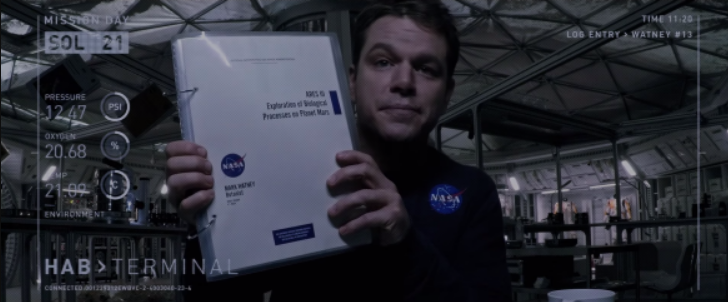 Imagine you’re an astronaut.
Imagine you’re an astronaut.
You’ve accidentally been left behind on Mars during an emergency evacuation because your team presumed you dead. It’s another four years until another mission lands, and you need to hold out until then. If that’s even possible. NASA discovers that you’re alive, and pushes hard to try and get you out, withholding your status from the rest of your team who are already en route back to Earth—for the next two years. You’re playing a very dangerous waiting game.
This is the plot of the 2015 movie The Martian, starring Matt Damon as the stranded Mars astronaut Mark Watney. I can almost guarantee you will never be in this situation. But then again, it’s not too unrealistic to empathize with Watney’s predicament. After all, when you encounter challenges that make you feel alone and uncared for, you may as well be stuck on Mars.
As I watched The Martian, I kept thinking about the lengths to which NASA went to rescue Watney. And after the credits rolled, I kept thinking about God’s place in this. Not just in what the movie was saying about rescue, but how my faith informed what I was watching. As a Christian and a huge fan of movies, I often find myself asking how I can engage with them meaningfully.
How do I talk about movies as a Christian?
There’s a tendency in Christian writing to treat movie reviews as a way to match a Bible story to the movie in question. While there are times when this makes sense, such as identifying similar characteristics and archetypes, I don’t think it’s always the best approach. Equating movie plots to Bible stories can accidentally put beliefs and context on the film that aren’t there. The Martian doesn’t align with Scripture one-to-one, so I won’t force it.
What movies actually can do is give us a lens to see how God is working in us. By emphasizing the personal takeaways, watching movies can help us process and reflect on our own lives in new ways. This applies to the good and the bad, the comforting and the confronting.
Take The Martian as an example: I’m not going to say that NASA’s extreme efforts to rescue Watney is about God going after the one lost sheep, because that’s ultimately not the point of the movie. But I can say that the difficulties that Watney faced remind me of God’s promises in my own life, and how he has gone after me in my times of doubt.
Watching The Martian helped me reflect on how much God has brought me through. I’ve struggled in times of feeling stranded on Mars without hope of rescue. Like how Watney was unaware of NASA working to make contact with him in his isolation, I was completely unaware of how God was working behind the scenes to show me his purpose.
What space stories teach us
It took a while for me to reflect on The Martian’s themes. They all work together, but that means they can be hard to name. As I reflected, I noticed that The Martian focused on homecoming, community, provision, and what it means to be human. Each of these themes were explored by two opposite sides of a conflict: on Mars and on Earth.
The visual contrast between Earth and Mars is probably the most noticeable way the movie explores its themes. Earth is lush, blue and green, while Mars is red, brown, and dusty. The two planets couldn’t be more different. By cutting between both of them—even by including shots of empty space as a buffer—you’re reminded how big the stakes are, how people can’t survive for long outside of the planet they’re designed for, and what is driving Watney to return home.
On Mars, the movie focuses on survival. It shows the sheer grit and cool-headedness required to live on a hostile planet as Watney heals his injuries, builds a greenhouse, and repurposes the Mars Pathfinder. Earth, meanwhile, is focused on rescue. You see the extreme effort, all the way through the chain of command, to help save Watney. Both Earth and Mars are doing everything they can to reach each other, and it’s ultimately Watney’s crew en route through space that bridges that gap.
The scope and impact of this operation was far-flung, but it also struck a chord in me personally. Through the lens of my faith, I was reminded how God moves in my own life. What makes our faith so incredible is that our “distress calls” reach God before we even know we’re in danger. He listens, he’s active, and he will never stop pursuing us, even when we run into our human limitations. In his strength, I don’t have to carry the burden of surviving alone. Whatever NASA was doing to help Watney, God is capable of an even more perfect rescue. He is bigger. Much bigger. Bigger than all the systems and calculations and logistics of survival, bigger than the very solar system he created.
Meaning in the average Hollywood movie
Because this is a movie, I wanted to reflect a little on how The Martian gets its meaning across. Overall, it’s a very average Hollywood blockbuster, which makes distinct takeaways a little difficult because they’re designed to appeal to most people. It’s not particularly innovative, its editing is fairly slick and seamless (“invisible editing,” in film language), and its conflict and resolution are predictable. Despite this, The Martian helps you understand what’s at stake through its technique.
For one, The Martian makes good use of distinct camera styles, namely Watney’s vlog camera. Recording data is visible around the screen as Watney hashes out a plan to survive.

Screenshot taken by wegeekgirls.com
In one scene, the camera zooms from the recording screen to real life, the data and pixelation in the image slowly being pushed out of frame. This comes at a pivotal point in the story, when the action slows down from a montage to focus on the explosion of Watney’s makeshift indoor potato farm.
The vlog format lets us know that he views his time on Mars as temporary, something to be documented and studied later when he either dies or gets rescued. These vlogs help him cope with this joint hope and despair. But by zooming into a live scene, the reality of his situation starts to hit. He is truly trapped, despite his efforts to stay ahead. The camera follows him as if to prove it. Little moments like this help us to feel that Watney is doing his utmost to survive, using everything at his disposal. That desperation carries through every character in the movie as they scramble to rescue him.
The camera slowed down to show us a disaster happening in real time, right after things were looking up. This made me think of times when I’ve also felt intense dread after a period of easy routine. When I wrap up an important life stage with no idea what to do next, or when I’m careless and accidentally hurt someone I care about, I stop going through the motions and feel suddenly aware that I haven’t been fully paying attention to God. Such moments of clarity remind me that I’ve forgotten about God’s good plans for me, and I’ve relied on my own ability instead.
Your reflections matter
So, why does this matter? Why does picking apart a movie that I watched for fun mean anything about God and understanding his promises? Well, the answer is sort of twofold.
First, I’m doing something that I like to point to him. I’m going to watch movies and think about them anyways. So why not honour God in the process? As I reflect, I’m using my gifts to glorify him in the way that I can.
Second, diving deep helps us hear God speaking through the art we engage with. Taking time to truly consider a movie’s messages and our responses to it is a wonderful way to allow this one specific expression to remind us of the much larger story that we’re a part of. The Martian presented a way for me to reflect on how God provides in my own life, through seasons of joblessness, loneliness, and not understanding how he made me.
I wouldn’t say that movies are parables in the biblical sense, but they serve a similar purpose. They can be pictures of God’s greater purpose. Reminders that we can find God in the most unexpected places.
He will continue to pursue us, even more than NASA repatriating a stranded astronaut.





